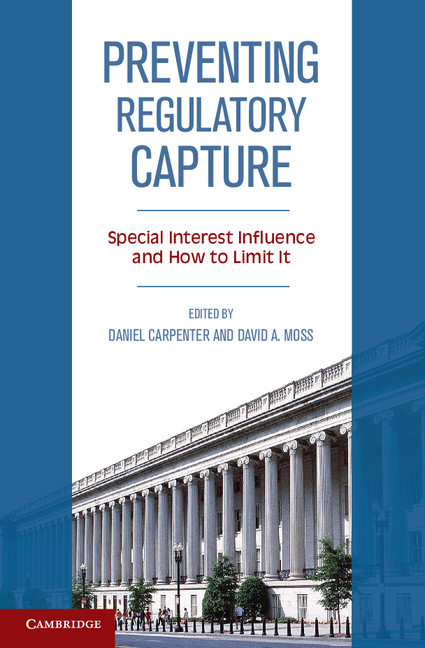Preventing Regulatory Capture: Special Interest Influence and How to Limit It
| « Previous Book | Next Book » |
|
Edited by Daniel Carpenter (Harvard University) and David Moss (Harvard Business School), Cambridge University Press, 2013 Read James Kwak's chapter, “Cultural Capture and the Financial Crisis” Cambridge University Press book page here.
Table of ContentsPreface Introduction SECTION I: FAILURES OF CAPTURE SCHOLARSHIP1. A Revisionist History of Regulatory Capture 2. The Concept of Regulatory Capture: A Short, Inglorious History 3. Detecting and Measuring Capture SECTION II: NEW CONCEPTIONS OF CAPTURE: MECHANISMS AND OUTCOMES4. Cultural Capture and the Financial Crisis 5. Complexity, Capacity, and Capture 6. Preventing Economists' Capture 7. Corrosive Capture? The Dueling Forces of Autonomy and Industry Influence in FDA Pharmaceutical Regulation SECTION III: MISDIAGNOSING CAPTURE AND CASE STUDIES OF REGULATORY SUCCESS8. Capturing History: The Case of the Federal Radio Commission in 1927 9. Conditional Forbearance as an Alternative to Capture: Evidence from Coal Mine Safety Regulation 10. Captured by Disaster? Reinterpreting Regulatory Behavior in the Shadow of the Gulf Oil Spill 11. Reconsidering Agency Capture During Regulatory Policymaking 12. Coalitions, Autonomy, and Regulatory Bargains in Public Health Law SECTION IV: THE POSSIBILITY OF PREVENTING CAPTURE13. Preventing Capture Through Consumer Empowerment Programs: Some Evidence from Insurance Regulation 14. Courts and Regulatory Capture 15. Can Executive Review Help Prevent Capture? Conclusion Afterword |
Praise for Preventing Regulatory Capture “'Regulatory capture' is an often used, little understood term. It is quoted frequently by those who would like to question a regulation for any of a number of agendas without an effort to understand the science or reason behind it. Daniel Carpenter and David Moss and the co-authors have written a long overdue analysis of the issue and what, when proven true, can be done about it.” – Christine Todd Whitman, former governor of New Jersey and former head of the Environmental Protection Agency “This is an enormously useful collection that goes beyond alleging and lamenting regulatory capture to provide diagnostic tools for evaluating purported instances of captured regulatory regimes and institutional techniques for avoiding their emergence and mitigating their effects.” – Jerry Mashaw, Yale University “This collection deftly sharpens our thinking about the nature of regulatory capture. It compiles the most multidimensional treatment we have of capture and the American regulatory state.” – John Braithwaite, Australian National University Summary When regulations (or lack thereof) seem to detract from the common good, critics often point to regulatory capture as a culprit. In some academic and policy circles it seems to have assumed the status of an immutable law. Yet for all the ink spilled describing and decrying capture, the concept remains difficult to nail down in practice. Is capture truly as powerful and unpreventable as the informed consensus seems to suggest? This edited volume brings together seventeen scholars from across the social sciences to address this question. Their work shows that capture is often misdiagnosed, and may, in fact, be preventable and manageable. Focusing on the goal of prevention, the volume advances a more rigorous and empirical standard for diagnosing and measuring capture, paving the way for new lines of academic inquiry and more precise and nuanced reform. |


